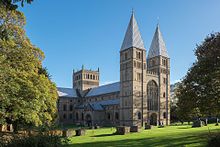| Southwell Minster | |
|---|---|
| Cathedral and Parish Church of the Blessed Virgin Mary | |
 | |
| 53°4′36″N 0°57′14″W / 53.07667°N 0.95389°W | |
| Location | Southwell, Nottinghamshire |
| Country | United Kingdom |
| Denomination | Church of England |
| Website | www.southwellminster.org |
| Architecture | |
| Style | Romanesque, Gothic |
| Years built | c.1108-c1300 |
| Specifications | |
| Number of towers | 3 |
| Number of spires | 2 |
| Administration | |
| Province | York |
| Diocese | Southwell and Nottingham (since 1884) |
| Clergy | |
| Bishop(s) | Paul Williams |
| Dean | vacancy |
| Precentor | Richard Frith |
| Canon(s) | Paul Rattigan |
Southwell Minster, strictly since 1884 Southwell Cathedral, and formally the Cathedral and Parish Church of the Blessed Virgin Mary, is a Church of England cathedral in Southwell, Nottinghamshire, England. The cathedral is the seat of the bishop of Southwell and Nottingham and the mother church of the diocese of Southwell and Nottingham; it is governed by a dean and chapter. It is a grade I listed building.[1]
The current church is the successor to one built in 956 by Oscytel, archbishop of York. Some late eleventh century fabric survives from this church, but the majority of the building dates from between 1108 and c. 1150, when it was reconstructed in the Romanesque style. The chancel was rebuilt from 1234 to 1251 in the Early English Gothic style. In 1288 the chapter house was built; it is decorated with carved foliage of exceptional quality. The minster's rood screen is also of high quality.
During the Middle Ages Southwell was part of the large diocese of York, and the archbishop maintained a palace adjacent to the minster. Although it was not a cathedral, the minster acted as the mother church of the surrounding area; Ripon Cathedral and Beverley Minster fulfilled a similar function in other parts of the diocese. The church was collegiate from its foundation until 1841, although the college was twice dissolved and re-founded during the English Reformation. It was a parish church from 1841 until 1884, when it became the cathedral of a new diocese covering Nottinghamshire and Derbyshire; in 1927 the diocese was divided by the creation of the Diocese of Derby.
